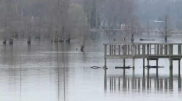Is Climate Change "Not Debatable"? Yes, Says Science
On May 21, the Obama administration ushered in Ernest Moniz as its new energy secretary. His firm stance on climate change is a breath of fresh air as many in political power continue to toe the line on mankind's impact on the environment.
“Let me make it very clear that there is no ambiguity in terms of the scientific basis calling for a prudent response on climate change," said Moniz in his address. "I am not interested in debating what is not debatable. There is plenty to debate as we try and move forward on our climate agenda."
So what, exactly, is "not debatable" about climate change? Well, as recent news stories have highlighted, nothing's more undebatable than scientific facts. Here are some recent developments in the world of climate science:
Scientists believe in climate change
Volunteers at Skeptical Science sifted through about 12,000 peer-reviewed climate science papers to figure out what scientists are saying about climate change.
Their study revealed 97 percent of scientists who published an opinion about climate change say that humans are contributing to the earth's warming.
This comes at a time when many still believe that there is a debate among scientists over this issue. A 2012 poll from the US Pew Research Center showed only about half of Americans thought scientists believed in human-made climate change.
We broke 400 ppm -- at an astonishing rate
Although it was falsely reported on May 9 that the atmosphere broke 400 ppm levels -- 399.52 was the correct reading -- it didn't take long for it to make that jump.
On May 20, a reading by the National Oceanic and Atmospheric Administration announced that we finally did it -- with a reading of 400.06.
This means that our atmosphere now contains at least 400 parts per million of carbon dioxide.
So, sure, this is the first time in human history that we've broken the 400 ppm level -- in fact, the earth hasn't seen this since the Pleistocene Epoch. Yes, that's 2.5 million years ago when the Earth was a very, very different place.
But what's even more disturbing is the rate of its increase. The atmosphere contained about 280 ppm during the 18th century (when the Industrial Revolution began and started burning fossil fuel) and has jumped at an astonishing rate. There is no known geologic period where this increase was so drastic.
The Columbia Glacier's Retreat
On May 17, President Barack Obama's twitter account (@barackobama) mentioned how "many in Congress continue to deny the science on #climate change [while] Alaska's Columbia Glacier continues to melt."
It included a link to some of Google's most startling time-lapse gifs, including a very telling view of the Columbia Glacier.
Although it was long known for its stability, the glacier started a very sharp retreat in the 1980s. Since then it's lost 12 miles in length and almost 1,300 feet in thickness.
The melting of the Arctic is one of the main contributors of rising sea levels around the world. Beyond that, our planet's ice reserve acts as a heat deflector, while our blue oceans absorb the sun's rays. The more our ice melts, the more our planet heats up. It's essentially destroying one of our natural defenses against global warming.





